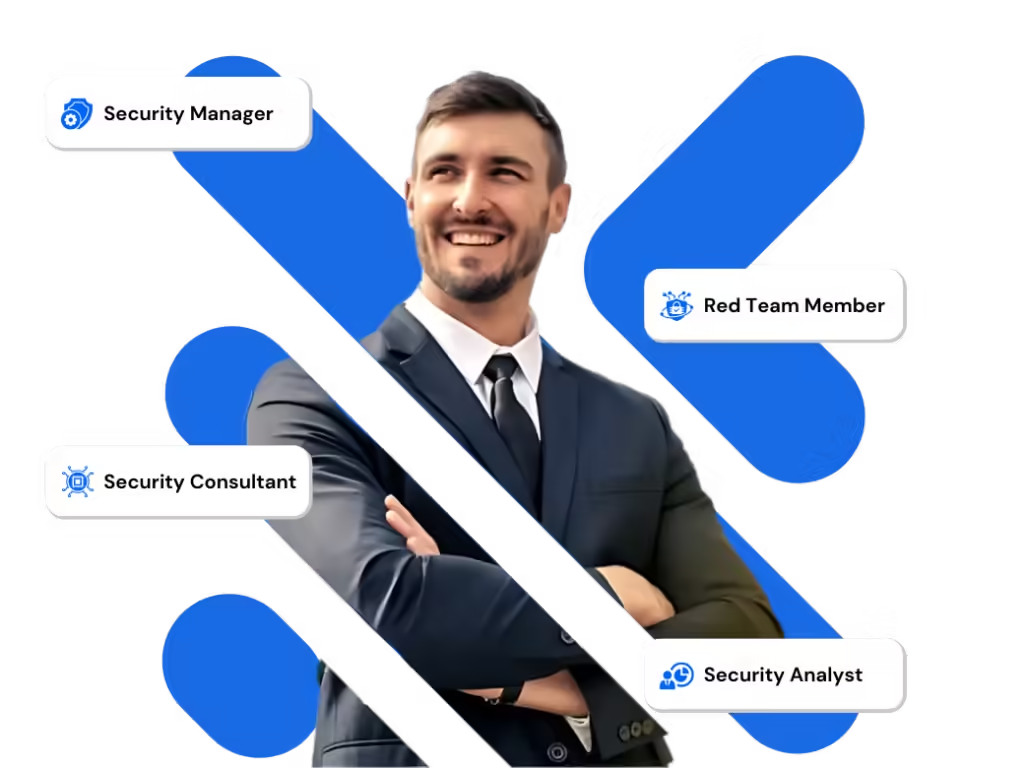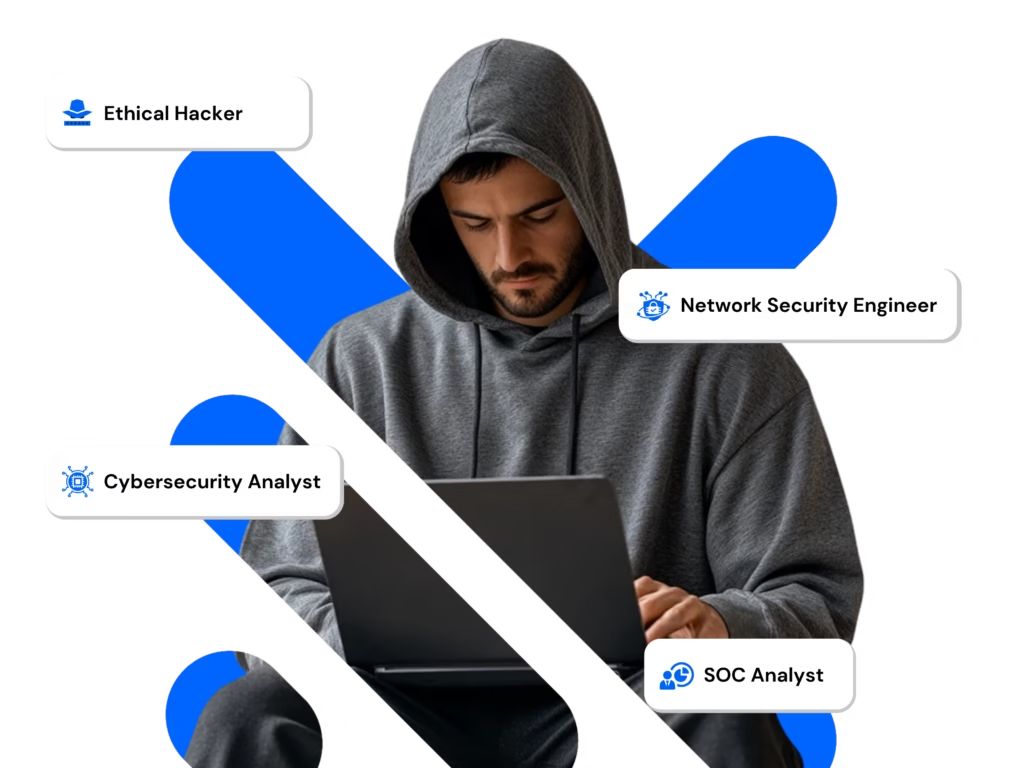Cybersecurity Courses for Non-Technical Professionals: Where to start
As businesses depend more on online platforms and digital tools, safeguarding confidential data has become a departmental duty. Whether you work in project management, marketing, finance, or human resources, having cybersecurity skills can advance your career and lead to new opportunities. If you’re new to cybersecurity. Numerous online courses, such as those provided by Cybrary, offer detailed learning pathways intended for non-technical individuals. These classes give you a solid foundation by going over typical risks, risk management, and fundamental security concepts. Expanding field, whether your goal is to increase security in your present position or investigate a career change into cybersecurity
Table of Contents
Top Entry-Level Cybersecurity Course Certification for Non-Tech backgrounds

CompTIA Security+
One of the most well-known and reputable entry-level cybersecurity certifications is CompTIA Security+. It covers over important ideas like threat detection, risk management, network security, and cryptography. For novices who wish to lay a solid foundation and pursue a career in cybersecurity, this certification is a great place to start because it is vendor-neutral and doesn’t require any prior technical experience.
Certified Ethical Hacker (CEH) certification
A widely accepted certification that teaches students the principles and methods of ethical hacking is the Certified Ethical Hacker (CEH). CEH provides non-technical people with an organized method for learning how hackers take advantage of systems and how to protect against them. Reconnaissance, vulnerability scanning, social engineering, and basic penetration testing are among its main topics. As a first step for prospective cybersecurity professionals who wish to develop their abilities without extensive coding knowledge, CEH offers no rigorous technical requirements.
Network Defender Certified (CND)
Network security and defensive tactics are the main topics of the Certified Network Defender (CND) certification. For non-techies who wish to understand how to safeguard, identify, and address network risks without delving further into offensive hacking, this is the perfect course. Firewalls, VPNs, endpoint security, and incident response are among the subjects covered by CND. This certification provides a solid basis for individuals seeking to transition into positions like IT auditor or security analyst by using a defensive and practical approach.
EC-Council Incident Handler
Another great entry-level choice for non-technical learners is the EC-Council Certified Incident Handler (ECIH). It teaches applicants how to deal with and react to cybersecurity events like data breaches, phishing scams, and virus outbreaks. The course focuses on organized processes, collaboration, and communication during security incidents—skills that are particularly appropriate for anyone who wish to contribute to cybersecurity from commercial, legal, or operations areas.
You can also visit senseacademy.co for course details.

Career Opportunities after basic cybersecurity course training
Compliance Analyst
A compliance analyst ensures that a company complies with internal cybersecurity policies and regulatory procedures. This is an excellent entry-level position for people with strong organizational and documentation abilities because one can comprehend risk controls, security frameworks, and audit standards with little cybersecurity training.
Risk Coordinator
Risk coordinators assist risk management teams by spotting possible security risks and putting mitigation plans into action. Particularly in sectors like finance, healthcare, and IT, non-technical people can succeed in this capacity with a basic awareness of cyber hazards, data handling, and threat identification.
Information Security Analyst
An information security analyst monitors for threats, examines security reports, and complies with safety regulations to keep an organization’s computer systems safe. Regular inspections and fixe vulnerabilities also contribute to increased security. Reasons It’s Beneficial for Non-Tech Backgrounds
A deep tech background is not necessary to get started. The primary focus of this function is on following established guidelines, managing alarms, and comprehending rules.
Security Analyst
An entry-level security analyst is essential to safeguarding an organization’s digital assets since they keep an eye on networks for threats, look into security incidents, and help put preventive measures in place. Working with SIEM tools to identify irregularities, examining logs and alarms, and assisting the incident response team are typical duties for this position. It is crucial to have a firm grasp of cybersecurity principles, networking ideas, and security procedures. SOC Analyst (Level 1), Junior Security Analyst, and Information Security Analyst are typical job titles for this role. For a career in cybersecurity, it’s an ideal spot to start.
Also check www.eccouncil. for more datils.

Decoding Cybersecurity: Importance of Cybersecurity Awareness
In today’s digital environment, where cyber dangers are ever-changing, cybersecurity knowledge is essential. It enables people and companies to identify threats such as malware, phishing, and data breaches and take preventative action. People can drastically lower their risk of being victims of cyberattacks by being aware of fundamental security procedures, such as creating strong passwords, identifying suspicious activities, and protecting sensitive information. The first line of defense for safeguarding private data and upholding digital trust is awareness.
What is meant by cybersecurity?
Cybersecurity is the process of defending data, networks, and systems against online threats. These attacks are frequently intended to disrupt business operations, extort money, or obtain, alter, or destroy important information. To protect against changing threats, cybersecurity entails several levels of protection applied to computers, networks, and data.
Core Concepts in Cybersecurity
The three main pillars of cybersecurity are availability, confidentiality, and integrity, or the “CIA Triad.” Data access is restricted to those who are permitted thanks to confidentiality. Data accuracy and unalteredness are ensured by integrity. Availability guarantees the accessibility of systems and data when required. When combined, these ideas provide a framework for safe online spaces.
Common Cyberthreat Types
Threats including malware, phishing, ransomware, and denial-of-service (DoS) assaults can be thwarted with the aid of cybersecurity. Every threat employs a different strategy, ranging from locking systems until a ransom is paid to misleading users into revealing passwords. To put in place efficient defenses and create a proactive security culture, people and organizations must have a thorough understanding of these dangers.
Conclusion
It is not necessary to have years of technical experience or a degree in computer science to get started in cybersecurity. These days, there are many beginner-friendly courses created especially to assist non-technical workers in making the shift into this in-demand area, such as EC-Council’s CEH, C|CT, CND, and GRC Essentials. Regardless of your commercial, legal, marketing, or administrative experience, cybersecurity offers a variety of opportunities that play to your strengths. The secret is to begin with fundamental information, acquire practical experience, and select credentials that align with your interests and professional objectives. Anyone may have a successful career in cybersecurity with the correct support and dedication; no prior knowledge of technology is necessary.
1. Without any technical experience or coding skills, is it possible to begin a career in cybersecurity?
Absolutely, without a doubt. Particularly in compliance, risk management, auditing, and entry-level analysis, many cybersecurity positions do not call for coding expertise. Learn the fundamentals from the ground up with beginner-friendly certifications like CEH, C|CT, or GRC Essentials.
2. If my experience is not in technology, which cybersecurity certification should I begin with?
The EC-Council’s GRC Essentials or Certified Cybersecurity Technician (C|CT) certifications are excellent places to start. For those without any prior IT or programming knowledge, these credentials offer a solid foundation in cybersecurity fundamentals.
3. What job profiles can I expect after finishing a cybersecurity course at the entry level?
Risk & Governance Associate, Security Analyst, Compliance Analyst, and SOC Analyst (Level 1) are among the positions you can apply for after finishing a foundational course like CEH or C|CT. For non-tech workers, these roles are perfect since they place more of an emphasis on monitoring, policy enforcement.





